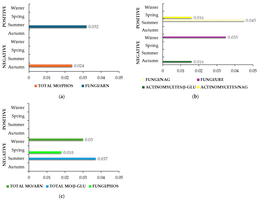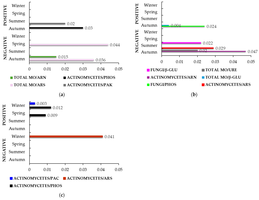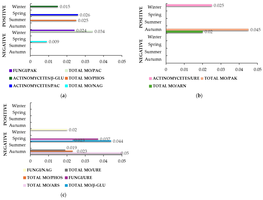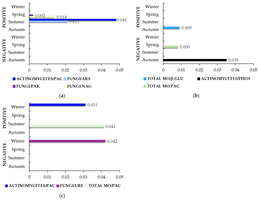This study deals with the complex interactions in soils of different agricultural systems. For this purpose, various fertilizers were applied to biodynamic, organic and conventional-integrated soils in Slovenia. The researchers then analyzed the correlations between microorganisms and enzyme activity in the soil. The results of the study show that biodynamic soils have particularly stable microorganism-enzyme relationships.
Biodynamic agriculture promotes stable soil ecosystems
The study was carried out on three farms in north-eastern Slovenia, which were cultivated in different ways: conventional-integrated, organic, biodynamic. The test plots were randomly planted in triplicate. In addition to an unfertilized control plot (Control, C), different fertilizers were used: standard fertilizer (SF), fertilizer from spent mushroom substrate (SMS), and a mixture of both (SF.SMS).
The soil samples taken were analyzed for the total number of microorganisms as well as for enzyme activity in the soil. Biodynamic soils exhibited the most stable microorganism-enzyme relationships in this series of measurements. The combined fertilization (SF.SMS) in biodynamic soils showed less influence on the microorganism-enzyme relationships, while positive correlations between fungi and enzyme activities occurred in conventional soils. Fertilization with SMS led to increased enzyme activity in conventional soils, and standard fertilizer (SF) led to a negative correlation between certain enzymes and microorganisms.


Evaluation of the biodynamic soil samples showed that both SMS and SF.SMS had no significant effect on the correlation between microorganisms and enzyme activity. This result suggests that the stability of the correlation is increased by biodynamic soil management, as these soils were least affected by fertilizer applications. Only standard fertilizer led to negative correlations in biodynamic soils, highlighting the sensitivity of biological balances to chemical interventions.
The results underline the importance of an adapted fertilization strategy to promote soil fertility and microbial health, especially in organic and biodynamic systems. Fertilizers affect the relationship between microorganisms and enzyme activity differently depending on soil type and management practices. Natural soil activity (high enzyme and microorganism diversity) supports nutrient cycles even without external inputs. Biodynamics thus promotes stable, self-regulating soils - a key to long-term soil fertility.
Commentary
The results of this study should be treated with caution. As the data collection was limited to only three farms in Slovenia, the results can only be generalized to a limited extent. The short study period of only one year does not allow an assessment of long-term fertilizer effects on soil microorganisms. In addition, the study can only demonstrate correlations, not causality. Nevertheless, the results of the study provide valuable information for sustainable soil management. Further research on microorganisms and enzymatic activity can help to fill existing knowledge gaps.
Sources and further links to this article
- Original study:
Pintarič, M., Štuhec, A., Tratnik, E., Langerholc, T. Specific Fertilization Practices Reveal Important Insights into the Complex Interaction Between Microbes and Enzymes in Soils of Different Farming Systems. Life, 14(12), 1562. 2024.
https://doi.org/10.3390/life14121562 - This study is covered by Creative Commons (link to license) and was summarized for this study report.

